In this article, we address a common question from parents, “My baby hits her head when tired; what is wrong..?” There are variations to this, such as the baby or toddler banging their head against the mattress, side, or wall.
Let’s take a look at this behavior, how common it is, when and when not it is considered normal, and what to do about it.
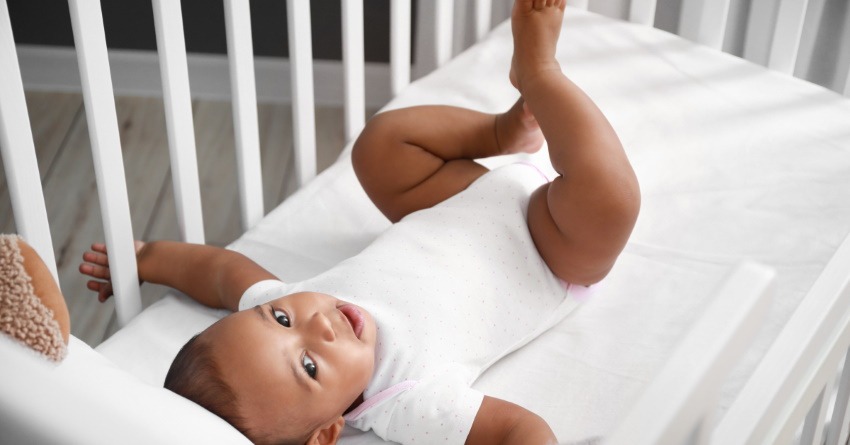
Mom’s Question:
Is it normal for a baby to hit her head repeatedly when she is tired or trying to go to sleep? Is this something I should be concerned about? The doctor said her ears were clear, but he had no answer for why she hit herself like that.
Dee Dee
Baby Hits Her Head When Tired: When is it normal or a problem?
One of many parents’ goals during a baby’s first year of life is to develop a sleep routine. After the first few months of frequent waking for feedings and diaper changes, some parents establish an evening regimen including, for example, a calm bath, a feeding, and putting their drowsy infant to bed.
Just when parents think bedtime will go as planned, the baby flips onto her belly and repeatedly bangs her head against the crib mattress. The impact does not appear to cause pain or distress but continues for several minutes before she ultimately falls asleep.
While this behavior can be quite startling for parents, it could be a normal infant sleep habit. Let’s elaborate on what is considered normal head hitting and signs of a problem.
Normal Head Hitting and Body Movements
Self-Soothing Behavior
During the first six months of life, infants learn to self-regulate based on feedback from caregivers. For example, they begin to understand that crying elicits the response of receiving attention. Around six months old, infants may begin to exhibit self-soothing behaviors such as head hitting, body rolling, or leg tapping.
Head hitting or banging prior to sleep is a typical infant behavior. According to The Sleep Foundation, 59 percent of 9-month-olds bang their heads at bedtime! These episodes last approximately 15 minutes and can also occur prior to naps. They may persist throughout the early toddler years, typically resolving by age three.
It is speculated that the head movements stimulate the vestibular nerve, which helps with sleep onset. Other self-soothing movements are also possible and still normal. Infants may repeatedly bang or tap one leg against the mattress surface until they fall asleep. Alternatively, they may initially roll side to side at six months old but do head movements at 12 months old.
In these cases, the headbanging or body movements do not affect sleep itself. Infant awake behavior is normal, and achievement of the expected developmental milestones remains on target.
Teething
The first teeth erupt between ages six to 12 months old. Around three to four months, however, infants may begin to notice some tooth movements. They drool and gnaw on fingers or other objects in an effort to massage their gums.
Once the pain of tooth eruption begins, many infants feel this discomfort on the outside of the jawline. In response, they use a hand to hit the side of the head where they feel pain. In addition to these signs, frequent crying at night, intermittent feeding difficulties, and low-grade fevers may occur. Read about more teething symptoms here.
Ear Infections
Similar to the head hitting while teething, this behavior is often noted when a baby has an ear infection. 50 percent of infants and toddlers under the age of two develop at least one ear infection. It is commonly associated with upper respiratory symptoms such as nasal congestion and coughing.
The pain of ear infections can trigger night-time waking and crying due to the discomfort. Because it is often difficult for parents to distinguish these symptoms from teething, it is best to seek medical attention.
Temper Tantrums
Many parents experience either the “terrible twos” or the “challenging threes.” Because vocabularies are limited and communication skills are still developing, toddlers often become frustrated when they cannot fully express themselves. Tantrums occur when a child is emotionally overwhelmed by a situation.
Head hitting against a hard floor can be alarming for parents, but most toddlers do it without causing injury. During these episodes, toddlers are fully conscious and aware of their surroundings. Ignoring and distraction techniques can reduce the frequency of tantrums, and most toddlers eventually outgrow this phase. Preventing tantrums is often the most effective.
Abnormal Head and Body Movements
Sleep-Related Movement Disorder
This condition is characterized by head banging or body rocking movements that result in injury or poor sleep quality. The movements may even continue while the infant or toddler sleeps. It is estimated that less than three percent of infants have this disorder, and it is more common in toddlers, older children, and adolescents.
Sufficient sleep is essential for growth and cognitive development. Because the movements disrupt sleep, daytime drowsiness, irritability, and problems with concentration are common. These symptoms can mimic those of attention deficit hyperactivity disorder.
No specific diagnostic test for sleep-related movement disorder exists, but neurological studies may be recommended to rule out other medical conditions. Electroencephalograms (EEG) are normal, but the use of 3D video monitoring is a promising new diagnostic technique.
Methods for managing this disorder focus on injury prevention. Cribs and toddler beds should be regularly checked for safety and screws that may loosen because of the movements. Padding, bumpers, and pillows are not recommended due to the risk of SIDS and injuries.
No specific treatments are available for this condition, but benzodiazepine medications may improve sleep and prevent self-injury.
Here is a recording of a child diagnosed with sleep-related movement disorder:
Benign Neonatal Sleep Myoclonus
This sleep phenomenon is characterized by repetitive muscle jerks that only occur during sleep. Unlike standard head-hitting or sleep-related movement disorders, these movements are much more rapid. They appear in clusters and can last up to one hour. One specific body part or the whole body may be affected.
It is suspected that benign neonatal sleep myoclonus occurs due to brain immaturity. All neurological studies produce normal results. For most infants, it self-resolves by age six months, but there have been cases documented at age three.
Seizures
Repetitive or jerking movements that are unrelated to bedtime or sleeping can be signs of a seizure. The whole body or one specific area may be affected during the episodes. Some seizures are associated with a loss of consciousness.
Depending on the seizure frequency and duration, developmental delays may be associated. A variety of medical conditions can cause them, such as infections, head injuries, and structural brain abnormalities.
The diagnosis is based on clinical symptoms and is confirmed by neurological studies. An EEG can detect the abnormal brain waves that trigger seizures. Brain abnormalities are visible by either a CT scan or an MRI. Treatment may involve dietary changes, anti-epileptic medication, and/or treating the underlying cause.
Autism
Head banging and body rocking movements are common self-soothing behaviors in toddlers and older children with autism. It is estimated that one in 68 children fit the criteria of a disorder on the autistic spectrum.
Early signs may be detected as young as six months old, and a loss of developmental milestones is concerning. For example, an infant who ceases to make eye contact, smile, and coo is considered at risk. Regression of language skills after the first birthday is also worrisome. Finds detailed signs of autism here.
When autism is suspected, an evaluation by a developmental pediatrician or pediatric neurologist can confirm the diagnosis. Speech, occupational, and ABA therapies are helpful for improving social skills, communication, and school performance.
What Can We Do At Home?
Regardless of whether or not head hitting when tired is benign or a sign of a medical problem, here are some steps to take to keep your baby or young child safe:
- Keep the crib or bed safe. It should be free of objects that could injure the head, leg, or torso. Although adding cushions, pillows, or bumpers may seem like a good idea, these are unsafe.
- Check for a source of pain. If a baby is difficult to console or has illness symptoms, head hitting could be a sign of teething or an ear infection.
- Think “safety first” during tantrums. Make sure the toddler is on a flat surface and away from any objects that could result in an injury.
Red Flags – When to talk to a doctor
Any abnormal head and body movements warrant an evaluation by a healthcare provider. Early detection of seizures and autism, in particular, can improve outcomes. Parents should call a doctor if daytime activities are affected, consciousness is lost, or developmental delays are present.
Takeaway
To conclude, as you can see, a baby hitting themselves when tired is a common and normal behavior in most cases. Medical reasons and pain should, of course, be excluded, but other than that, just make sure your child is safe.
One thing to remember is to not react strongly to it! If you start giving your baby a lot of attention when hitting, there is a risk that you will reinforce the behavior. Instead, ignore it as much as possible and divert your baby’s attention to something else if the behavior disturbs you a lot or you are afraid that your baby can get hurt. Why not try a lullaby and cuddle, for example? Or patting the lovey?
But again, if it is just a matter of hitting the head relatively softly when tired, it is likely to be a self-soothing thing and really nothing to worry about.
I hope this helps,
Paula
Read Next
I hope this helps,
Paula
Research References
- Öztürk Dönmez R, Bayik Temel A. Effect of soothing techniques on infants’ self-regulation behaviors (sleeping, crying, feeding): A randomized controlled study. Jpn J Nurs Sci. 2019 Oct;16(4):407-419. doi: 10.1111/jjns.12250. Epub 2019 Feb 6. PMID: 30729735.
- Babies & Head Banging at Night
- Head Banging & Body Rocking
- Sleep-related rhythmic movement disorder
- Rhythmic Movement Disorder – an overview
- Gall M, Kohn B, Wiesmeyr C, van Sluijs RM, Wilhelm E, Rondei Q, Jäger L, Achermann P, Landolt HP, Jenni OG, Riener R, Garn H, Hill CM. A Novel Approach to Assess Sleep-Related Rhythmic Movement Disorder in Children Using Automatic 3D Analysis. Front Psychiatry. 2019 Oct 16;10:709. doi: 10.3389/fpsyt.2019.00709. PMID: 31681030; PMCID: PMC6806394.
- Reports of Injury Risks and Reasons for Choice of Sleep Environments for Infants and Toddlers
- Benign Neonatal Sleep Myoclonus – an overview
- Potential Risk Factors for the Development of Self-Injurious Behavior among Infants at Risk for Autism Spectrum Disorder

Paula Dennholt founded Easy Baby Life in 2006 and has been a passionate parenting and pregnancy writer since then. Her parenting approach and writing are based on studies in cognitive-behavioral models and therapy for children and her experience as a mother and stepmother. Life as a parent has convinced her of how crucial it is to put relationships before rules. She strongly believes in positive parenting and a science-based approach.
Paula cooperates with a team of pediatricians who assist in reviewing and writing articles.

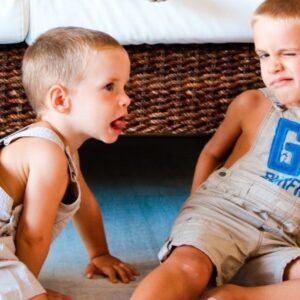
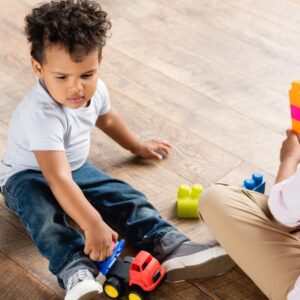
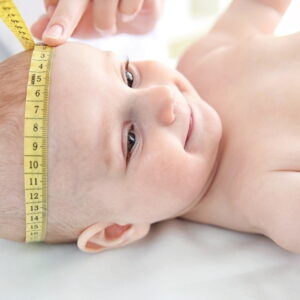
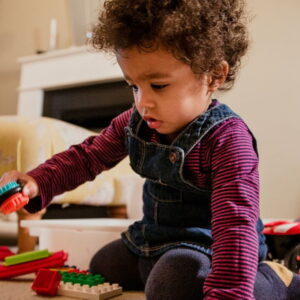
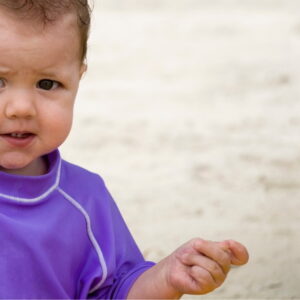
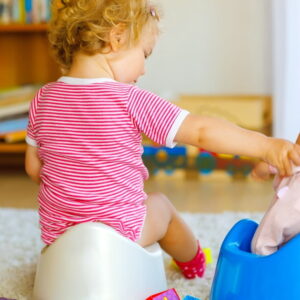
So does mine, but he started wayyyy before teething ever kicked in. I noticed it when he was drinking the bottle and getting sleepy and trying to stay awake…..kinda like when adults eat and get sleepy, but we can walk around or tap our faces to stay awake. I just figured he was at least aware of where his thinking was coming from – and this was just his way of trying to stay awake.
My Baby is 4 months, and she does the same thing. I thought it was because she may have water in her ear from bathing.
I’m glad I’m not the only one with concerns. My daughter is 6 months old and hits herself in the head when she Is tired and drinking her bottle. I was very worried that maybe something was wrong with her; she also rocks back and forth a lot which worries me too; she does it most of the time, even in her high chair when I’m feeding her, and is getting nose bleeds now when she sleeps too
My 6-month-old son also does this. I can distract him and get him to stop though if I hold his hand, it seems to calm him as well. I hope this helps someone else if they have or cont. to have this problem. Thank you for all your help. It is hard to watch this behavior.
Glad to know my baby is not the only one to do this. He stopped for a few months but has started again just recently. I think he is tired, and he is teething more, too; by the way, he is chewing everything in sight.
Oh, good…it sounds like it’s pretty normal. My 6-month-old does this, too, but only when he’s overly tired, teething or doesn’t have something in his hand. I’ve found that giving him a corner of a blanket or a small stuffed animal stops him from hitting. I’ve heard it’s only because they don’t know how to just stop their bodies. As adults, when we’re exhausted, we lay down and breathe out a sigh of relief; babies don’t know to do that yet. I’ve watched my little guy just shake his blanket instead of hitting, so this could be a solution for some…they may just need an outlet to get rid of the extra energy.
My six-month-old hits her head very hard with a solid fist! It’s been happening for two months now. And it only happens when she’s going to sleep or having her bottle. She does it with her left hand and on the left side of her face. It got really red today, so I finally decided to look it up. The doctor said it’s probably from teething, but I don’t know. I feel much better to see that it’s kinda normal for them when they’re either tired or feeding.
Hi everyone! Our 9 month old son has started doing this within the last month, and the trend is the same…tired. What a relief to know how many of us neurotic, panicking parents there are! LOL. It sounds like our kids are alright, let’s hang in there and just help protect those beautiful heads of theirs! xo
My 9-month-old daughter has just started doing this when she’s tired and fighting sleep. She is also teething…… apparently it’s normal.
My 10-month-old hits himself in the head, but it’s only when he’s tired and usually when he actually starts falling asleep. I’m glad to know he’s not the only one, and it seems pretty normal.My mother (who is Ms. Doom and Gloom) gets so worried over every little thing, and it actually didn’t seem too abnormal to me only because, to this day, I shake my leg when I get sleepy, but I just wanted to be sure.
I am happy to know other babies do this. My 13-month-old has been hitting her head when she gets angry or tired for about 3 weeks, and I was worried.
My baby is two now; since she was 4 months, she’s been hitting her head. Doctors never know. My daughter is making me worried a lot, from hitting her head to pulling her hair. I wonder what that means? All I know is that since she was born, she has had a sleeping problem, but now she’s ok and wouldn’t stop hitting her head. Very worrying. I’m thinking of seeing a psychologist, but I heard they are no better than doctors.
Unless your baby slaps her head throughout the day for no apparent reason and seems to be missing her milestones, you probably don’t have to worry. What she does is common and likely to level off within a year. Read here about why babies hit themselves and what to do about.
My 5 mth old baby used to hit me during breastfeeding. Now that we have started on formulas, she has been hitting her bottle during feeding. And the last few days, she has started hitting her face. That’s when I got worried. Reading all your posts kind of comforted me, but I am still wondering if this self-beating (especially on the head) harms them. Does anyone have any info from the doctors? Otherwise, my LO is fit and healthy. She just does this frantic thumb-sucking and head-hitting when she’s tired or feeding… strange.
My little guy is 6 months old and has been hitting his head now for about a few weeks. However, he hits his legs, mouth, cheek, and ear, lol. We were concerned as well, but our Dr. Said he was doing great. The fact that he is teething leads us to believe that is part of it as well as he is tired dice; that is when he does it the most. But as I always do and say, when it comes to your little ones, never take chances and always call the dr. ;)
OMG, My son started doing this, too at 9 months old. (Just last week ago) I asked the Dr she didn’t know. I was and still am a bit worried. What if there is something wrong, and he is trying to tell me? Hopefully,y it is teeth or tiredness
My girl just turned seven months, and I noticed she just started hitting herself on the left side of her head. She does seem to do it when she’s tired or unstimulated. I’m so happy she is not the only one. Now I won’t worry about it anymore.
My daughter is 6 months, and she just started doing it just like one of the other moms described – only when I nurse her on the right side hit her head. I have to hold her arm because she hits hard. It worries me.
My son has been doing this for many months now. I thought he would grow out of it by now. He also likes to “head butt” when he is sleepy. We tell him “NO -NO”, then he gets mad and starts hitting his head. I try to put his hand/fist down when he does this, and sometimes it works.
My 6-month-old daughter has been hitting herself in the head for about a month when she is feeding and getting ready to sleep. As a younger baby, she would hit herself with a closed fist in the stomach during these times. I am really relieved to see that so many of you are seeing the same thing and at the same age, too! I wasn’t worried about autism or anything silly like that (I am a special education teacher, so we have extensive education ourselves in what those symptoms look like). However, it can be disturbing to see bc she gives herself quite a blow. We have a ton of slobber which may be the whole teething thing kicking in.
My daughter is 5 months; she began having seizures when she was barely 2 months old. She was diagnosed with Focal Onset Seizures in the right parietal lobe. She began hitting herself in the head with her hand during feeding, being tired, or just frustrated about 4 months. I honestly thought it was due to the medications they have her on to control her seizures. I see the neurologist this week and will ask more questions regarding this behavior; it concerns me a great deal due to her medical history.
Hi Sunshine,
Were you able to get any further information from the neurologist regarding the baby hitting herself in the head? I’m curious to see what a medical professional thinks because my daughter does the same thing.
Please post to let me know.
My 5-month-old daughter always punches her stomach on her left side. it sounds like she’s really hurting herself, but she never cries. it happens when we change her diaper or are changing her clothes. I think she’s trying to figure out all her little muscles.
My 5-1/2-month-old just started doing this too. I was afraid he had “issues”. It’s always when nursing, and I think when he’s tired also. If I try to stop his arm or block it, he’ll stop nursing and fuss until I let him do it again. So now I just let him go. He’s also teething, so everything above adds up. I’ll still ask the pediatrician about it at his 6 mo appt just in case.
My 15 month old just started doing this also. But even weirder is that every time we read Goldilocks and it says “Naughty Goldilocks …’ she does it. We have never smacked her or threatened it and she is an only child who stays at home with me full time so has had no exposure to an kind of violence from other toddlers. The only thing i can think of is that when she falls and hurts herself we say jokingly “Naughty floor/wall/whatever she hurt herself on” and give it a hit. It was meant to be a joke but now I’m feeling like I’ve instilled a hitting habit in her. Oh well i guess I’ve learnt a lesson…:-(
My daughter is 5 and 1/2 months old and has been hitting herself in the head while she eats (a bottle) for several weeks now. She hits herself pretty hard. I try to catch her arm or put my hand on her head so she hits my hand instead. I can’t figure out why she started but am hoping she’ll stop. Glad to see she’s not abnormal.
thank goodness my 9-month-old baby hits her head on the right side repeatedly and is up a bunch of times at night she seems okay during day but does hit her head during day time too.. I am thinking it is teething
so glad others are having same issue
I was concerned that this may be a sign my little girl was autistic. She mostly hits the sides of her head while nursing but there are times when she does it when she isn’t nursing. She started this at 5 months and is now 9 months. I usually place my hand in the way so she can hit my hand but she will grab my hand and move it so she can do it more.. I usually will start singing a funny song that she likes and it distracts her and she forgets she was doing it. Her next checkup I’m going to mention it to the Dr to see if he can give me some answers.
I feel so much better after reading some of these posts. My 7-month-old baby girl Just started hitting herself in the head 3 days ago but only does it right before bedtime feeding. She is teething and I just recently quit breastfeeding her and put her on formula. This really gives me a piece of mind. I’m taking her to a doctor visit tmw and was gonna ask him about it and still is but not near as worried now.
My 6 1/2 month old son has been doing this for some time now. Mostly when he is tired and nursing or taking the bottle. Makes me nuts too! Glad to hear that he isn’t the only one. He may be close to teething also.
My 5-month little boy has just started too, originally, though, he was hitting his stomach, The doctors have told me its something they do to stimulate themselves, I’m not sure if it was a good thing or if he was implying I’m not giving him enough to do! Anyway, after reading all your comments I’m not worried at all, he only does it when he is feeding and he is teething at the mo. Thanks for the reassurance! xx
Our 11 month old son started hitting himself in the head before bed time while drinking a bottle. Seems like this may be a normal thing to do.
My son does the same thing. He’s 13 months old and he’s been doing for about 3 or 4 months now. Its so comforting to know he’s not the only one doing this :-)
I am so glad to have found this post. I’ve been concerned for months about my daughter hitting herself in the head – it does always seem to be when she’s tired/nursing/eating. She’s a year old now. I’m so glad to know I’m not alone in not only my concerns but that my daughter’s behaviour is not uncommon. :-)
Yes. My 6 month old hits herself with left hand near left temple. We don’t like it! It sound pretty common though?
My granddaughter is hitting her self in the head also on the left side. We all pull her hand away and say no pretty face. It is always same area of side of forehead near temple. Any other parents having the same area of head?
My baby is 5 months old and just recently started bonking herself on the head while drinking her bottle, and usually she’s tired. I am hoping it is related to teething pain and isn’t anything to worry about. I am relieved it is so common.
Well, my baby is 2 years old and I’m extremely concerned about this situation. He hits his head every time he is going to bed. He does it against the pillow, but anyways that scares me. I’m not sure if that situation can cause a brain damage
My baby has been hitting herself on the head (and hard!) while drinking her bottle, especially she’s tired and ready to go to sleep. I mentioned it to her pediatrician and she wasn’t concerned. She’s 9 months old now and has been doing it for a few months. I usually try to catch her hands so she hits my hands instead of her head.
Thank God mine isn’t the only one. My 5 month old daughter does this too and it worries me bad. She only does it when she nurses and most of those times she is extremely tired. I hope she stops soon.
OMG, you do not know how happy I am to hear that your babies do this too! My daughter is 5 months old and has done this for over a month now when she is trying to fall asleep! It’s really scary! I hope she grows out of it!!!
My son does it too. I think his arm may have nowhere comfy to fall and he discovered bonking his head with it? Or maybe its from my coffee drinking or from my meds??
My daughter is 4 months old and hits herself in the head when she is going to sleep these days…Had me worried to, but it seems to be pretty common.
When I nurse my seven month old daughter, she starts hitting herself on the left side of her head, pretty hard. She is my third child and the only one who has done this. I am hoping it will stop soon, she’s been doing this now for about two weeks. My doctor thinks it could be pain from teething.
My child is 11 months old and is still doing it so i hope that it’s normal.
My baby is 5 months old and hits herself in the head…. DRIVES ME NUTS!! I feel bad and that something is wrong…. I have read it is normal and I just hope it stops soon! Who knows maybe she is “special” Let’s hope not and move on!
as first-time grandparents, we were very worried when our 6-month-old grandson started hitting his head. thank you for your reassurance that he is not alone
My 9-month-old also hits the side of her head when she is tired. I think she does it when she is struggling to fall asleep. I also think it has to do with her teething as well. Maybe somehow keeping the rhythm helps her to fall asleep and also to ignore the tooth pain.
I thought my 14-month-old had a problem. She does it all the time when feeding. I am so glad to hear she is not the only one.
My daughter just woke up an hour ago and she started hitting the side of her head,she is 8 months old .am scared cos this is her first time doing this
Hi,
It could be her ear, throat or teething. Or she just does it to soothe herself. Watch for signs of illness and teething and maybe also take her temperature.
Good luck,
Paula
I’m so glad to hear its normal my 14 month old only seems to do it at bed time but he hits the from of his head I didn’t know If it was from being sleepy or if it was because of his teething but either way it really concerned me. it just looks painful :-(
My baby is 7 weeks old and he’s hitting himself when he’s tired. I notice other babies engaging in this behaviour are older. Should I be worried?